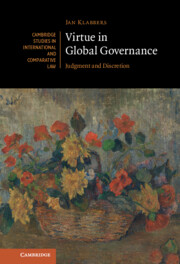Book contents
- Virtue in Global Governance
- Cambridge Studies in International and Comparative Law: 170
- Virtue in Global Governance
- Copyright page
- Dedication
- Contents
- Preface
- 1 Introduction
- 2 Ethical Challenges
- 3 The Individual in Global Governance
- 4 Virtue Ethics and Global Governance
- 5 On Virtue and Law
- 6 Operationalizing Virtue
- 7 Understanding Governance
- 8 Defining Governance
- 9 Evaluating Governance
- 10 Epilogue
- Bibliography
- Index
- Cambridge Studies in International and Comparative Law
1 - Introduction
Published online by Cambridge University Press: 28 July 2022
- Virtue in Global Governance
- Cambridge Studies in International and Comparative Law: 170
- Virtue in Global Governance
- Copyright page
- Dedication
- Contents
- Preface
- 1 Introduction
- 2 Ethical Challenges
- 3 The Individual in Global Governance
- 4 Virtue Ethics and Global Governance
- 5 On Virtue and Law
- 6 Operationalizing Virtue
- 7 Understanding Governance
- 8 Defining Governance
- 9 Evaluating Governance
- 10 Epilogue
- Bibliography
- Index
- Cambridge Studies in International and Comparative Law
Summary
We live in a normative universe: a world of rules. Those rules can be legal rules, moral rules, sports rules, rules of the game. They can be formal or informal. On the road, we are subject to traffic rules. At home, we are embedded in frameworks set by rules concerning marriage, childcare, education. And when we tell our children how to behave, we tend to refer to rules. In Peter French’s pithy formulation: “We teach rules, not lives.”
- Type
- Chapter
- Information
- Virtue in Global GovernanceJudgment and Discretion, pp. 1 - 26Publisher: Cambridge University PressPrint publication year: 2022



